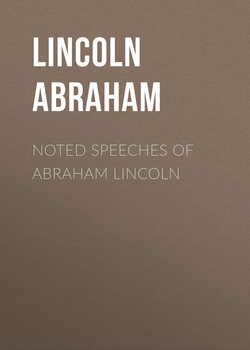Noted Speeches of Abraham Lincoln

Реклама. ООО «ЛитРес», ИНН: 7719571260.
Оглавление
Lincoln Abraham. Noted Speeches of Abraham Lincoln
FOREWORD
ABRAHAM LINCOLN
COOPER INSTITUTE SPEECH
LINCOLN’S FIRST INAUGURAL ADDRESS
LINCOLN’S GETTYSBURG SPEECH
LINCOLN’S SECOND INAUGURAL ADDRESS
PROCLAMATION OF EMANCIPATION
STEPHEN ARNOLD DOUGLAS
LINCOLN-DOUGLAS DEBATE
LINCOLN-DOUGLAS DEBATE
Отрывок из книги
In a little log-cabin in Hardin County, Kentucky, on the 12th of February, 1809, was born a future President of the United States, Abraham Lincoln.
When Abraham was seven years old, his father, Thomas Lincoln, moved with his family to Indiana. It was a cold, dreary winter for them in the rude shed which Abraham, knowing well how to handle an ax, had helped his father to build. The following autumn found them in a better cabin, but brought to Abraham the loss of his mother, Nancy Hanks Lincoln, leaving his sister Sarah, eleven years old, to care for the household. But the next year the little home was much changed; for a stepmother had come, a woman of energy and thrift, who provided the children with comforts before unknown to them. She became very fond of Abraham and encouraged his inclination for reading and study. One year would probably cover all the schooling he ever had, but he set to work with a will to educate himself, sometimes walking miles to borrow a book.
.....
Two of the twenty-three voted against congressional prohibition of slavery in the Federal Territories, in the instances in which they acted upon the question. But for what reasons they so voted is not known. They may have done so because they thought a proper division of local from Federal authority, or some provision or principle of the Constitution, stood in the way; or they may, without any such question, have voted against the prohibition on what appeared to them to be sufficient grounds of expediency. No one who has sworn to support the Constitution can conscientiously vote for what he understands to be an unconstitutional measure, however expedient he may think it; but one may and ought to vote against a measure which he deems constitutional if, at the same time, he deems it inexpedient. It, therefore, would be unsafe to set down even the two who voted against the prohibition as having done so because, in their understanding, any proper division of local from Federal authority, or anything in the Constitution, forbade the Federal Government to control as to slavery in Federal territory.
The remaining sixteen of the “thirty-nine,” so far as I have discovered, have left no record of their understanding upon the direct question of Federal control of slavery in the Federal Territories. But there is much reason to believe that their understanding upon that question would not have appeared different from that of their twenty-three compeers, had it been manifested at all.
.....